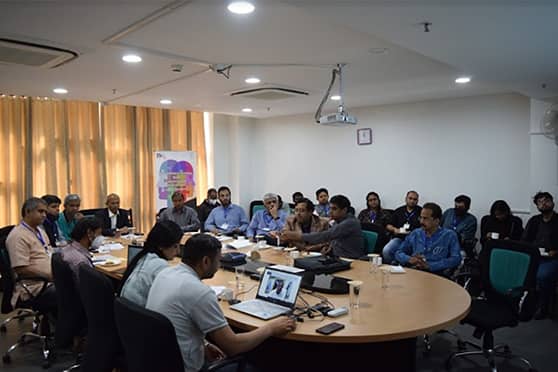IIT Mandi organises workshop on Indian Knowledge System and mental health


The Indian Institute of Technology (IIT) Mandi’s workshop on Indian Knowledge System and mental health, held between March 25 and 27, aimed to provide students, academia, and practitioners with insights on empirical research pertaining to Indian Knowledge System (IKS) and mental health.
With the advent of leading artificial intelligence and human-computer interaction, the Indian Knowledge System (IKS) education highlights the importance and benefits of this system for the body, the mind and consciousness. The workshop covered talks and brainstorming on graduate curricula based on IKS, as well as different research topics related to it.
The workshop was held in partnership with IIT Mandi iHub and HCI Foundation and sponsored by the State Bank of India, Netweb Technologies, and Hospimedical.
Addressing the inaugural event, its chief guest K Sanjay Murthy, secretary of the ministry of education, Government of India, said, “The transformation of traditional knowledge forms into science is the need of the hour. It is essential that these knowledge systems be standardised in terms of their utility and consumption by the general population without creating any hype or unverified claims. I am glad that IIT Mandi has taken this step to formalise Indian Knowledge Systems as a scientific discipline. Mental health is also subjected to a great deal of social stigma in India, with youth and seniors alike suffering from various mental disorders. It is important that this subject be dealt with within the Indian Knowledge Systems within a holistic framework for its acceptance among Indians.”
Using bio-signals such as electroencephalograms (EEGs), brain imaging, as well as virtual reality-based immersive neuron-feedback, the programme envisioned at IIT Mandi seeks scientific innovations aimed at addressing mental health with the Indian Knowledge System. This will allow both IKS and mental health challenges to benefit from a scientific approach.
Highlighting the importance of the workshop, Laxmidhar Behera, director of IIT Mandi, emphasised that the very foundation of the IKS was built on the hypothesis that matter in its elementary (subtle) form is cognitive and thus cognitive emotion, and behaviours are not emergent properties of any complex molecular combinations.
Welcoming those present at the workshop, Behera said, “Is the mind simply the brain in action, or a more fundamental object than any fundamental object known within empiric science? Even the Nobel laureate Christof Koch has changed his stance from the former to the latter. Understanding cognition qua cognition is not only a very fundamental question within science but also has the ability to change the discourse of natural science and associated technology in complementing harmonious and sustainable existence.”
Behera went on to highlight how recent studies on IKS such as yoga, meditation, music, Sanskrit, and other forms of performing arts also demonstrate the therapeutic values they bring to human psychic nature in terms of cognitive enhancement, stress relief, alleviation of depression, and so forth. “Biological signals such as electroencephalogram (EEG) and functional brain images along with the virtual reality-based neuro-feedback approaches have ushered a new age of scientific innovations where many claims of IKS can be verified and standardised for effective consumption by the general populace”, he added.
Underlining the importance of this approach, Laxmidhar Behera, said, “Mental health is becoming an issue for everyone like a pandemic due to a lack of proper scientific understanding of the holistic nature of body, brain, and mind. This workshop is a platform where experts will deliberate on all issues related to IKS and its relevance to mental health. IIT Mandi has taken the initiative to start an academic programme on IKS and mental health. A proper deliberation will help this program to get the right direction. There will be a brainstorming panel discussion on course curriculum as well as a similar discussion on enumerating relevant research agendas useful for society at large. I welcome everyone for joining in these very important deliberations that may set new standards for an inclusive paradigm for science and technology.”
Workshop participants focused on issues related to IKS and mental health through expert presentations, poster sessions, panel discussions, and brainstorming sessions.
While giving the welcome speech, Varun Dutt, an associate professor at the School of Computing and Electrical Engineering of IIT Mandi, said, “In a world driven by cutting-edge artificial intelligence and human-computer interaction, the Indian knowledge system (IKS) education may first seem to be an urban legend. However, recent research reveals the importance and benefits of IKS for the human body, mental health, and wellbeing. In fact, IKS has deep roots that are grounded in Indian history, philosophy, society, arts, languages, science and technology, and life sciences.”
Speaking about the objectives of the workshop, the guest of honour, Padma Shri winner Acharya Nagendra, said, “Firstly, I would like to congratulate IIT Mandi for organising such an event which has brought together experts from all around the world to share their knowledge about the Indian Knowledge System. With mental health becoming a major concern globally, it is imperative we go back to our Indian Knowledge System and find solutions that can help us lead better lives.”